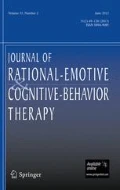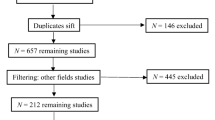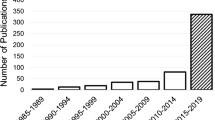Abstract
This study aimed to predict problematic smartphone use based on early maladaptive schemas (EMS) and five schema domains. Machine learning algorithms were used to test the predictive models based on data collected from 1000 smartphone users. The study tested the predictive models by employing six machine learning classification algorithms (i.e., Bayes Net, SMO, IBk, Multi-Class Classifier, Decision Table, and Random Forest). The first predictive model was built on 14 schemas and tested by using 10-fold cross validation method. Results indicated that Multi-Class Classifier achieve a better prediction than other classifiers in classifying low-risk and high-risk smartphone users based on 14 schemas with an accuracy of 68.2%. The second model, which was built on five schema domains, was tested by using the best performance algorithm. Multi-Class Classifier predicted the users based on schemas related to the “impaired autonomy and performance” domain (i.e., “enmeshment/dependence, vulnerability to harm, and failure”) with an accuracy of 66.2%. Further, the classifier predicted the users based on schemas related to the “disconnection and rejection” domain (i.e., “abandonment, emotional deprivation, defectiveness, and social isolation/mistrust”) with an accuracy of 65.2%. Results emphasize the significance of EMS in predicting problematic smartphone use.

Similar content being viewed by others
References
Amancio, D. R., Comin, C. H., Casanova, D., Travieso, G., Bruno, O. M., Rodrigues, F. A., & Costa Lda, F. (2014). A systematic comparison of supervised classifiers. PloS One, 9(4), e94137. doi: https://doi.org/10.1371/journal.pone.0094137
APA. (2013). Diagnostic and Statistical Manual of Mental Disorders (Fifth ed.). Arlington, VA: American Psychiatric Publishing
Arpaci, I. (2020). Relationships between early maladaptive schemas and smartphone addiction: the moderating role of mindfulness. International Journal of Mental Health and Addiction. https://doi.org/10.1007/s11469-019-00186-y
Arpaci, I., & Esgi, N. (2018). Psychometric properties of the Turkish version of the smartphone addiction inventory (SPAI). Current Psychology, 39(6), 2246–2251. https://doi.org/10.1007/s12144-018-9913-8
Ballestar-Tarín, M. L., Simó-Sanz, C., Chover-Sierra, E., Saus-Ortega, C., Casal-Angulo, M. D. C., & Martínez-Sabater, A. (2020). Self-perception of dependence as an indicator of smartphone addiction-establishment of a cutoff point in the SPAI–Spain inventory. International Journal of Environmental Research and Public Health, 17(11), 3838. DOI: https://doi.org/10.3390/ijerph17113838
Brand, M., Wegmann, E., Stark, R., Müller, A., Wölfling, K., Robbins, T. W., & Potenza, M. N. (2019). The Interaction of Person-Affect-Cognition-Execution (I-PACE) model for addictive behaviors: Update, generalization to addictive behaviors beyond internet-use disorders, and specification of the process character of addictive behaviors. Neuroscience & Biobehavioral Reviews, 104, 1–10. https://doi.org/10.1016/j.neubiorev.2019.06.032
Elhai, J. D., Dvorak, R. D., Levine, J. C., & Hall, B. J. (2017). Problematic smartphone use: A conceptual overview and systematic review of relations with anxiety and depression psychopathology. Journal of Affective Disorders, 207, 251–259. https://doi.org/10.1016/j.jad.2016.08.030
Elhai, J. D., Yang, H., Rozgonjuk, D., & Montag, C. (2020). Using machine learning to model problematic smartphone use severity: The significant role of fear of missing out. Addictive Behaviors, 103, 106261. doi: https://doi.org/10.1016/j.addbeh.2019.106261
Fernández-Delgado, M., Cernadas, E., Barro, S., & Amorim, D. (2015). Do we need hundreds of classifiers to solve real world classification problems? Journal of Machine Learning Research, 15, 3133–3181
Hosseinzadeh, Z., Sayadi, M., & Orazani, N. (2019). The mediating role of mindfulness in the relationship between self-efficacy and early maladaptive schemas among university students. Current Psychology. https://doi.org/10.1007/s12144-019-00487-4
Howard, D., Maslej, M. M., Lee, J., Ritchie, J., Woollard, G., & French, L. (2020). Transfer learning for risk classification of social media posts: model evaluation study. Journal of Medical Internet Research, 22(5), 14. doi:https://doi.org/10.2196/15371
Hsieh, W. H., Shih, D. H., Shih, P. Y., & Lin, S. B. (2019). An ensemble classifier with case-based reasoning system for identifying Internet addiction. International Journal of Environmental Research and Public Health, 16(7), 17. doi:https://doi.org/10.3390/ijerph16071233
Ioannidis, K., Chamberlain, S. R., Treder, M. S., Kiraly, F., Leppink, E. W., Redden, S. A., & Grant, J. E. (2016). Problematic internet use (PIU): Associations with the impulsive-compulsive spectrum: An application of machine learning in psychiatry. Journal of Psychiatric Research, 83, 94–102. doi: https://doi.org/10.1016/j.jpsychires.2016.08.010
Ioannidis, K., Treder, M. S., Chamberlain, S. R., Kiraly, F., Redden, S. A., Stein, D. J., & Grant, J. E. (2018). Problematic internet use as an age-related multifaceted problem: Evidence from a two-site survey. Addictive Behaviors, 81, 157–166. doi: https://doi.org/10.1016/j.addbeh.2018.02.017
Jabłoński, M., & Chodkiewicz, J. (2017). Early maladaptive schemas and level of depression in alcohol addicts. Psychiatria i Psychologia Kliniczna, 17(3), 165–171. https://doi.org/10.15557/PiPK.2017.0018
Laier, C., Wegmann, E., & Brand, M. (2018). Personality and cognition in gamers: Avoidance expectancies mediate the relationship between maladaptive personality traits and symptoms of Internet-gaming disorder. Frontiers in Psychiatry, 9, 304. https://doi.org/10.3389/fpsyt.2018.00304
Lin, Y. H., Chang, L. R., Lee, Y. H., Tseng, H. W., Kuo, T. B. J., & Chen, S. H. (2014). Development and validation of the smartphone addiction inventory (SPAI). PLoS ONE, 9(6), https://doi.org/10.1371/journal.pone.0098312
O’Brien, C. (2011). Addiction and dependence in DSM-V. Addiction, 106(5), 866–867. https://doi.org/10.1111/j.1360-0443.2010.03144.x
Schneider, L. A., King, D. L., & Delfabbro, P. H. (2018). Maladaptive coping styles in adolescents with Internet gaming disorder symptoms. International Journal of Mental Health and Addiction, 16(4), 905–916. https://doi.org/10.1007/s11469-017-9756-9
Shorey, R. C., Anderson, S. E., & Stuart, G. L. (2012). Gender differences in early maladaptive schemas in a treatment-seeking sample of alcohol-dependent adults. Substance Use & Misuse, 47(1), 108–116. https://doi.org/10.3109/10826084.2011.629706
Soygüt, G., Karaosmanoǧlu, A., & Çakir, Z. (2009). Assessment of early maladaptive schemas: A psychometric study of the Turkish Young schema questionnaire-short form-3. Turk Psikiyatri Dergisi, 20(1), 75–84
Tabachnick, B. G., & Fidell, L. S. (2013). Using Multivariate Statistics (6th ed.). Northridge, LA: California State University
Young, J. E. (1995). Cognitive therapy for personality disorders: A schema-focused approach. Sarasota, FL: Professional Resource Exchange
Young, J. E., Klosko, J. S., & Weishaar, M. E. (2003). Schema therapy: A practitioner’s guide. New York, NY: Guilford Press
Author information
Authors and Affiliations
Corresponding author
Ethics declarations
Ethical Approval
“All procedures performed in studies involving human participants were in accordance with the ethical standards of the institutional and/or national research committee and with the 1964 Helsinki declaration and its later amendments or comparable ethical standards.”
Informed Consent
“Informed consent was obtained from all individual participants included in the study.”
Conflict of interest
“Authors declare none.”
Additional information
Publisher’s Note
Springer Nature remains neutral with regard to jurisdictional claims in published maps and institutional affiliations.
Rights and permissions
About this article
Cite this article
Arpaci, I. Predicting problematic smartphone use based on early maladaptive schemas by using machine learning classification algorithms. J Rat-Emo Cognitive-Behav Ther 41, 634–643 (2023). https://doi.org/10.1007/s10942-022-00450-6
Accepted:
Published:
Issue Date:
DOI: https://doi.org/10.1007/s10942-022-00450-6




